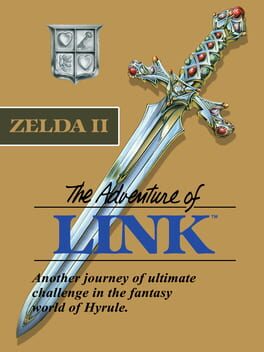The black sheep moniker is certainly earned, but I'd hesitate to say that it's deserved. What many overlook is that this is where Zelda's core contextual puzzle solving gameplay really got its start. By that, I mean, generally, the pattern of hanging out in the local town's rumor mill and then using its citizens' chatter to plan your exploration of the overworld. Of course, you could argue that this started in Zelda I, but this game manages to have more convincing inhabitants than geezers in caves. That's not to say the copy/paste villagers here really feel like much more than dressed-up hints, but it's still hard to imagine Kakariko or Clock Town or Windfall existing in the future without them. A lady in Nabooru tells you she's thirsty and it's not like you have to brave a dungeon to fetch her a pail of water, instead you pick some up at a fountain about ten feet from her house, a sort of semi-realistic logic that later games in the series would expand on as technology progressed. Unfortunately, in 2023 this one's best played with at least a world map pulled up, which ruins the positive side of its cryptic nature. Stumbling upon Bagu's cabin in the middle of the woods is a great moment, but it's diminished when you realize that doing so unlocks the shameless trial-and-error section on Death Mountain. Though, the combat is what remains especially interesting 35 years later and dungeons are where it shines- combining the unconventional core of platforming, twitch reactions, space management, and strategic resource utilization with classic dungeon-crawling route development in an extremely challenging but always encouraging adventure. The Dark Souls ancestry is obvious on the surface level (leveling stats individually, having to internalize an enemy's rhythm to effectively block and avoid attacks, being able to clear roadblocks to create world shortcuts) but I'd contend that this general feeling is the two's biggest shared element. Despite how difficult (often egregiously so) both can get, you can make consistent progress as long as you're skilled and clever enough, and stuff like the one-time use extra lives and EXP pickups really add to that. Beneath it all is a gratifying power fantasy- every new spell, every heart container, every magic upgrade is a genuine triumph, a new notch in Link's belt, a permanent enhancement that you really just feel. But, like nearly every other NES game, this one's difficulty curve devolves into absolute insanity at the eleventh hour. This kind of stuff makes it prime material for a remake with a few more modern sensibilities, but, if Zero Mission is any indicator, the soul of these 80s games tends to get lost in adaptation. Guess I'll have to settle for the inevitable indie spiritual successor...
Replaying this one made me want to see an alternate history where the series applied its anthological story approach to its gameplay genres while retaining the same core philosophies for each entry. For better or for worse, the one-two punch of A Link to the Past and Ocarina of Time etched the franchise's formula into the most solid stone known to man. Of course, Breath of the Wild would eventually come along and shatter this set of traditions into a million pieces, but this came at the expense of.... it not really being a Zelda game at all! Can't have my cake and eat it too, I suppose.
Replaying this one made me want to see an alternate history where the series applied its anthological story approach to its gameplay genres while retaining the same core philosophies for each entry. For better or for worse, the one-two punch of A Link to the Past and Ocarina of Time etched the franchise's formula into the most solid stone known to man. Of course, Breath of the Wild would eventually come along and shatter this set of traditions into a million pieces, but this came at the expense of.... it not really being a Zelda game at all! Can't have my cake and eat it too, I suppose.
3 Comments
>This kind of stuff makes it prime material for a remake with a few more modern sensibilities.
I recall a ROM hack for this game called "Amida's Curse," which retains the basic mechanics, but redesigns the game to be less manic & cryptic. You may wish to try it.
ROM hacking and modding really carries certain video games.
I recall a ROM hack for this game called "Amida's Curse," which retains the basic mechanics, but redesigns the game to be less manic & cryptic. You may wish to try it.
ROM hacking and modding really carries certain video games.
Looks cool, thanks for putting it on my radar. I've always wanted to get more into romhacks but it just seems like there's so many of them without much of a way to determine which ones are good.

garcaso
1 year ago